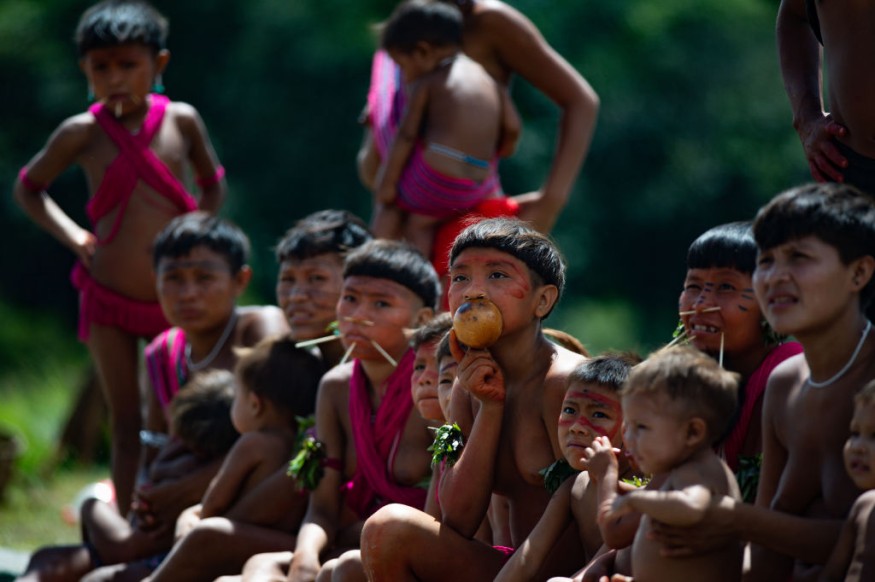Brazil Yanomami Indigenous People Living in Dire Conditions as Illegal Mining Destroys Their Territory

Officials in Brazil reported that the Yanomami Indigenous people live in dreadful conditions because illegal gold miners threaten them with violence and prevent essential supplies like food and medicine from reaching the area.
Indigenous Health Secretary Weibe Tapeba said Tuesday that the government should remove the miners, especially those armed, from the Yanomami reservation land along the border with Venezuela, Al Jazeera reported.
In a radio interview, Tapeba compared Yanomami's living environment to a concentration camp.
"It's an extreme calamity. Many Yanomami are suffering from malnutrition, and there is a total absence of the Brazilian state," he noted.
The announcement comes three days after Brazil announced a public health emergency for them. The Yanomami people live in the Amazon rainforest in Brazil's northern state of Roraima.
Most of them have reportedly been suffering from starvation and diseases like malaria due to the mining operations in the area.
Critics said the government turned a blind eye to forest burning and violations of Indigenous peoples' rights under previous far-right President Jair Bolsonaro, allowing corporations to expand their operations into the Amazon illegally.
According to a report published in April 2022 by the Hutukara Yanomami Association, the amount of "garimpo," or wildcat gold mining scarring land on the Yanomami reservation, increased by 46% in 2021.
16 Starving Yanomami Indigenous People in Brazil Receive Emergency Treatment
After the government declared a medical emergency, at least 16 malnourished Yanomami indigenous people were airlifted to receive urgent treatment in a hospital.
President Lula da Silva has claimed that his predecessor, Jair Bolsonaro, committed genocide against a tribe living in the Amazon rainforest, BBC reported.
The government declared a medical emergency after hundreds of Yanomami children succumbed to hunger linked to water pollution due to mining and logging in the forested area, where food insecurity is common.
Reports of chronic hunger among Yanomami children prompted Lula to travel to Roraima on Saturday. He described his visit as leaving him "shocked." Roraima borders Venezuela and Guyana.
"More than a humanitarian crisis, what I saw in Roraima was genocide: a premeditated crime against the Yanomami, committed by a government insensitive to suffering," he noted. "I came here to say we will treat our indigenous people as human beings."
The Yanomami reserve is home to approximately 28,000 indigenous people who hunt and practice small-scale slash-and-burn agriculture to survive. They live in small and semi-permanent communities.
During his four years in office, Bolsonaro frequently criticized the expansiveness of indigenous reserves and pledged to make part of them available for agriculture and mining.
Critics said his statements encouraged illicit activity in the region and that his government weakened environmental protections.
Yanomami Indigenous People in Brazil
According to Weibi Tapeba, children were losing their hair because of the mercury used to extract gold from ore, and this was all the result of an invasion of more than 20,000 shady gold miners, NBC News reported.
Bandits are reportedly too well-armed to allow medical aid teams to enter the area. To overcome this problem, Tapeba said, the military force must remove the gold miners.
The Supreme Court of Brazil issued an order to expel the gold miners. Bolsonaro's government never complied. The Yanomami's leaders have claimed that their cries for aid have gone unheard.
Citing data obtained by a FOIA, the Amazon journalism platform Sumauma reported that 570 Yanomami children died not only from malnutrition but also from malaria, diarrhea, and malformations caused by the mercury in the rivers.
Although illegal gold miners have been a problem on the reservation for decades, the situation had escalated since Bolsonaro's election in 2018, when he offered to legalize wildcat mining and enable mining on indigenous grounds that were previously protected.
Flavio Dino, the minister of justice, said Monday that there was "evidence of genocide" that was being investigated.
However, the Yanomami were not the only tribe in danger. Dr. Andre Siqueira, a tropical medicine expert in the Roraima region, has reportedly seen "similar conditions of lack of support and treatment" in other indigenous areas.
Siqueira noted that this must be addressed promptly to avoid further "catastrophic" and "disastrous' situations.
This article is owned by Latin Post.
Written by: Bert Hoover
WATCH: Brazil: Yanomami Indigenous Community Risks Becoming Extinct - From UN Human Rights
Subscribe to Latin Post!
Sign up for our free newsletter for the Latest coverage!
© 2026 Latin Post. All rights reserved. Do not reproduce without permission.














